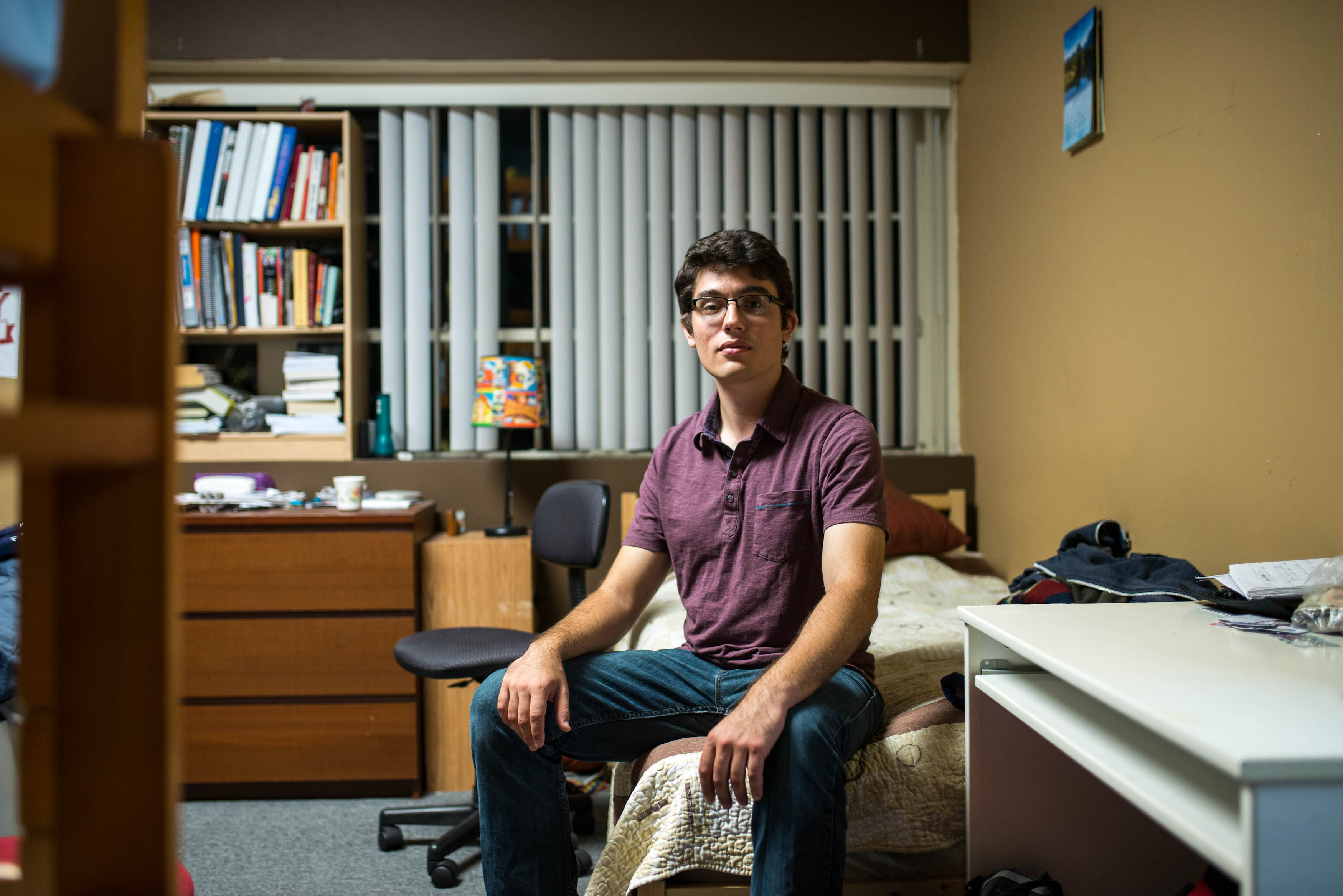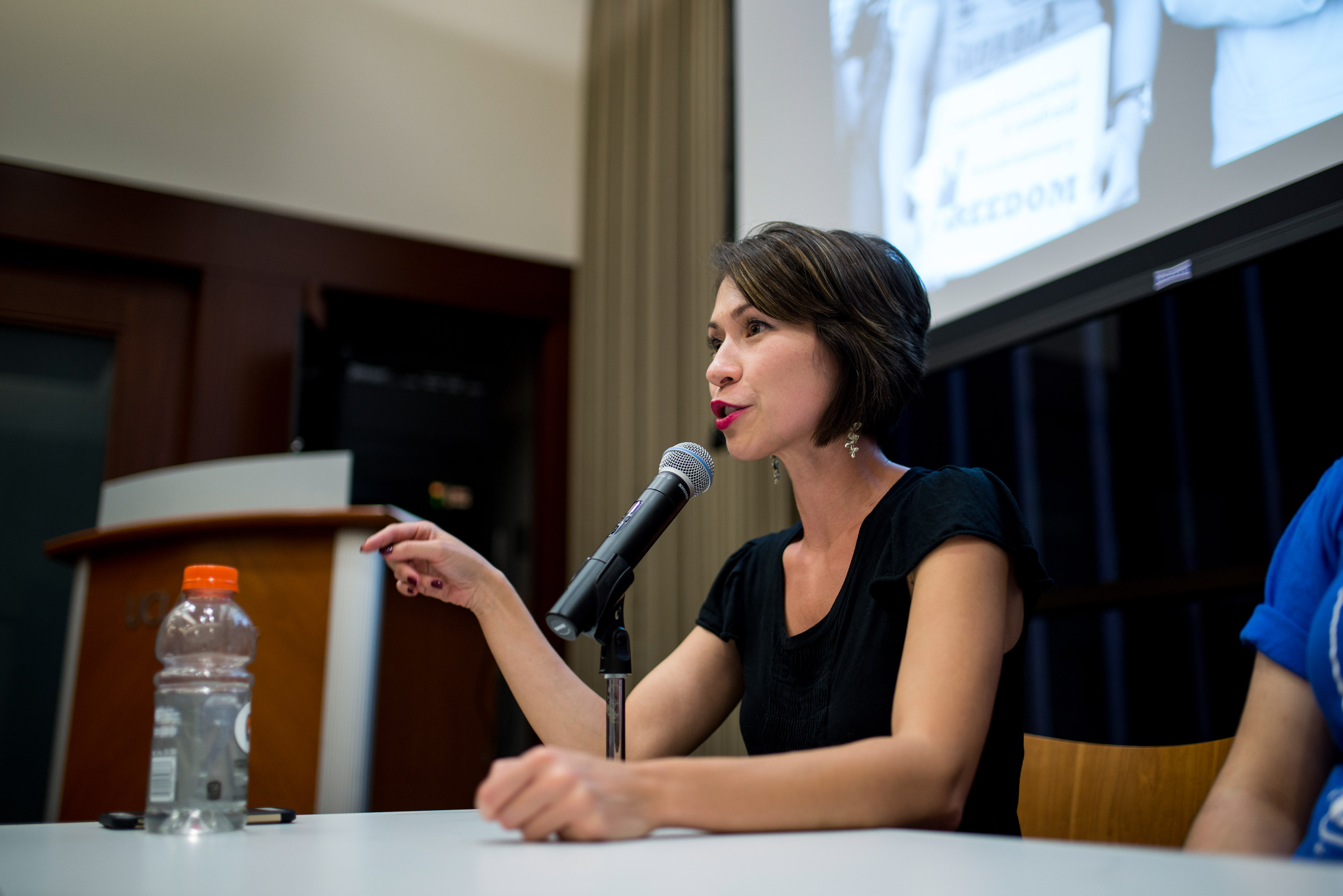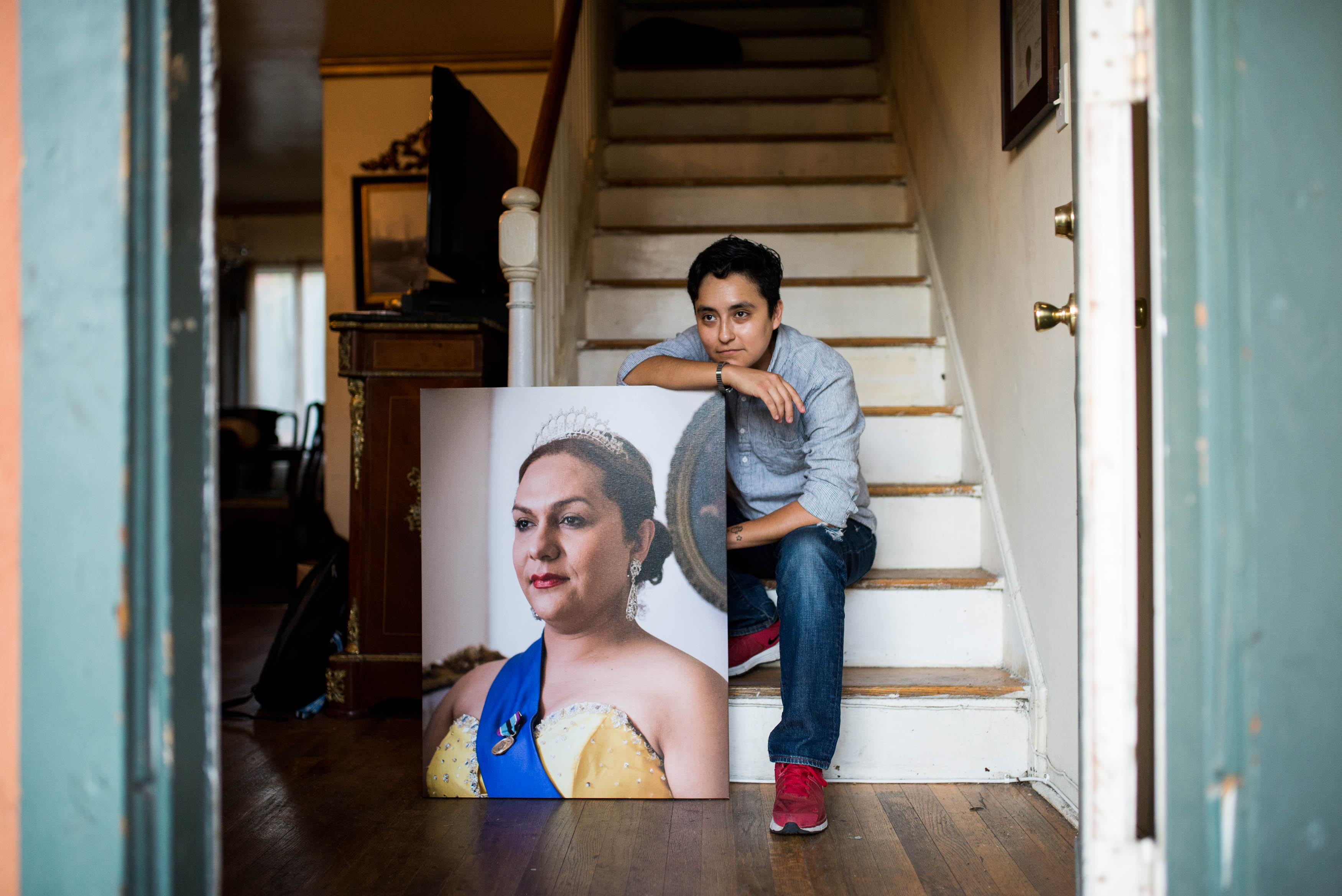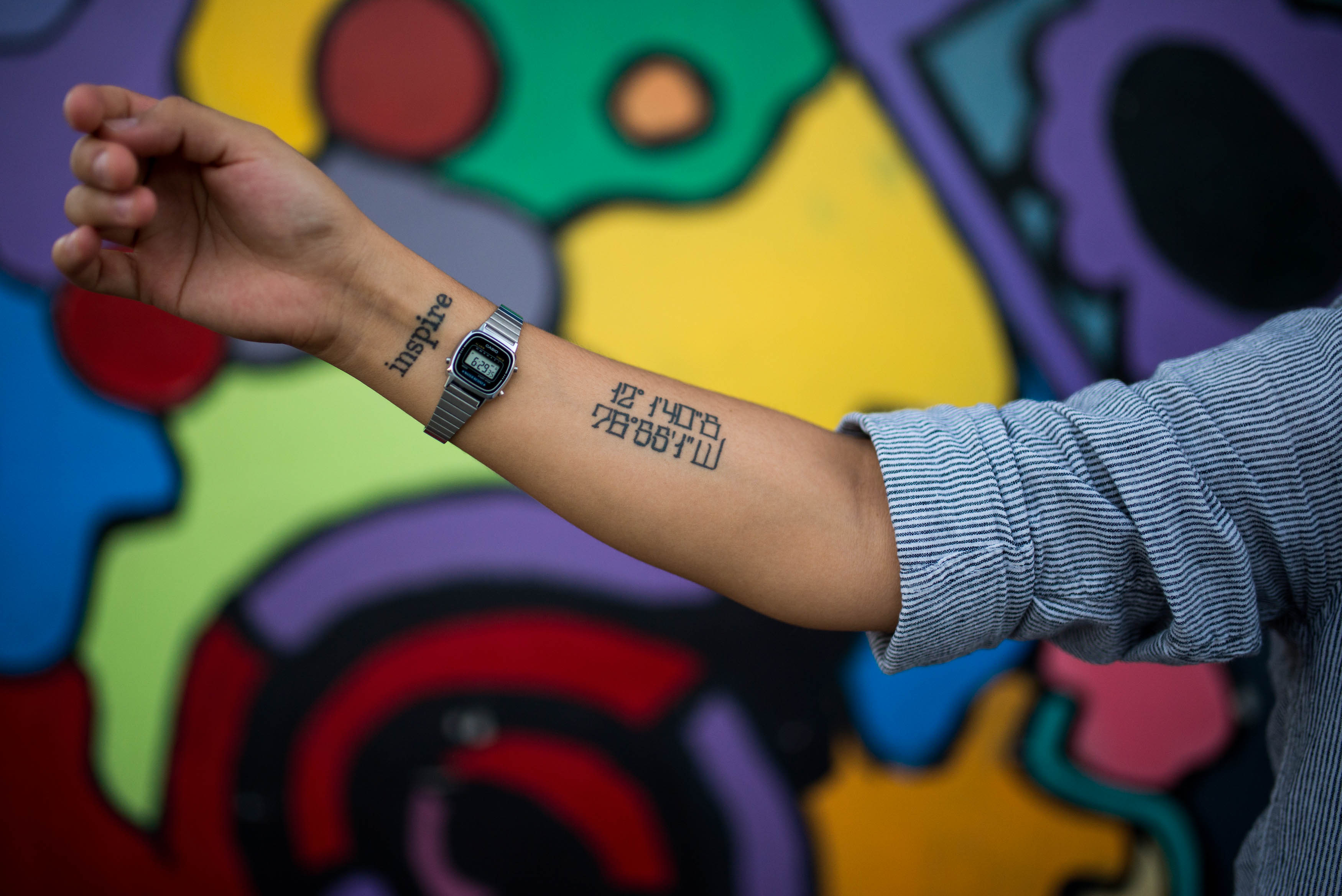Above: Laura Emiko Soltis is the director of Freedom University, an Atlanta based advocacy school that supports undocumented students in their desire to pursue higher education.
A Fighting Chance
Editor's Note
The lives of undocumented people in the United States are at the whim of state officials who create policy to fill the gaps in federal legislation.
Some undocumented students in the United States are admitted to college with resident tuition and state aid. Others - different only in where they live - are banned from public institutions.
Reporter Natalie Delgadillo, opinion columnist Ryan Nelson and photojournalist Angie Wang spent 11 months piecing together what it means to be an undocumented student in the United States. They looked at the lives of students in California, where policies are comparatively lenient, and in Georgia, where students are subject to some of the harshest higher education policies in the country. They found that the stories of students in both states shed light on the arbitrary nature of immigration policy in a country where federal action on the issue continues to stall.
The Bridget O’Brien Scholarship Foundation has funded eight years of UCLA student journalism with global reach and local impact, including this project. To learn more about the scholarship, visit rememberingbridget.com.
In 1994, California was in the throes of an economic recession, its unemployment rate increasing rapidly as it continued to bleed jobs in once flourishing industries. At the same time, it had the largest population of undocumented residents of any state in the country, already up to 1.3 million and getting larger.
So it wasn’t hard that year for Assemblyman Dick Mountjoy, R-Monrovia, and Republican allies in the state Assembly to find supporters for one of the farthest-reaching pieces of anti-immigrant legislation in the the country’s recent memory.
Proposition 187, also known as the Save our State, or SOS, initiative, banned undocumented immigrants from accessing any public benefits in California, including health care and public education. Had the law not eventually been struck down as unconstitutional, it would have prevented undocumented children from attending K-12 education, and it would have prevented every undocumented student living in California from attending college in the state.
Only seven years after the passing of Proposition 187, California voters would pass a bill giving some undocumented students resident tuition rates. And 10 years after that, Californians would pass the California Dream Act, giving those same students access to state financial aid for college.
In the years following the dismantling of Proposition 187, California transformed into perhaps the most progressive state in the nation on issues of unauthorized immigration, consistently passing legislation to further assimilate and integrate undocumented immigrants. Undocumented people in the state can obtain a valid driver’s license here. Some qualify for public health care. And several California cities have ordinances expressly prohibiting local police from working with federal immigration enforcement authorities.
Community activism

Evolving ideas on community activism
California’s comparatively welcoming policies for undocumented students have not dampened the activism happening among students here. Click to expand.
Immigrants’ rights activists look at the transformation of Californians’ views on immigration, and see the possibility of a national shift.
At the very least, they see a reason for optimism in places like Georgia, where the fight has just begun.
Freedom University
Inside of a small blue building in a residential Atlanta neighborhood, a professor stands at the front of a packed room of students, gesturing widely as he discusses the song he has just played for the room – Ozomatli’s “Coming War.”
“This is a call to resist a particular way of thinking about the world,” Ed Lee, professor of debate, says emphatically. “Complicity is a choice.”
The room is packed beyond capacity. About 50 students sit in folding chairs lined up in messy rows, notebooks on their laps, scribbling. A few are leaning against the wall, holding their notebooks in front of them like choir music.
“This is a call to resist a particular way of thinking about the world. Complicity is a choice.” Ed Lee
Every face in the room is alert, focused. Many of these students are new to Freedom University, attending their first semester. Some are returners. All are undocumented and struggling to attend university in the state of Georgia, where they are required to pay out-of-state tuition in addition to being banned from the top five schools in the state.
Susana Ramirez sits straight upright at the very front of the classroom, rapt with attention. This is only her third class at Freedom University, but she shows no trace of shyness or doubt. Nearly every time Lee asks a question, her hand shoots up, ready.
Ramirez is 18 years old. She just graduated from Berkmar high school a few months ago, and despite her strong desire to attend college, she has been unable to enroll in any classes except the ones at Freedom University.
She came to the United States from Colombia when she was 5 years old, following her father who had already immigrated here years before. Until she began the college application process, Ramirez did not know about the ban or the out-of-state tuition requirements for students like her.
When she found out, she felt frustrated and hopeless, resenting the state she had called home for more than a decade. But Freedom University has allowed her to start seeing past that resentment.
Resources for undocumented students
The following are some resources that undocumented students asked the University of California for at its first summit on undocumented students in May. The UC said it is "working with the campuses and the undocumented student service coordinators to determine the feasibility of recommendations" made at the summit.
- Create outreach programs that specifically target undocumented students
- Engage parents of undocumented students in outreach efforts, including orientations and conferences
- Mandate UndocuAlly trainings for faculty and staff across the UC
- Produce systemwide guidelines on what resources should be available to undocumented students at every UC (scholarships, comprehensive legal services for students and their families, internship and research opportunities for DACA and non-DACA eligible undocumented students, etc.)
- Establish more emergency grant programs and need-based scholarships for undocumented students
- Expand graduate student opportunities (provide fee waivers for applications, greater financial aid, fellowships and research opportunities, etc.)
- Broaden access to internships for all undocumented students, whether or not that student is AB 540 or DACA eligible
- Advocate for the California Dream Act to cover all undocumented students, regardless of whether they are AB 540 eligible
- Lobby for comprehensive immigration reform
“This place gives me hope that college is a possibility for me,” she said.
Immediately after the Board of Regents of the University System of Georgia instituted the ban on undocumented students in 2010, a group of professors at the University of Georgia, or UGA, created Freedom University to help undocumented students in the state continue their studies. The founders based the organization on the Freedom Schools of the 1960s civil rights movement, which were alternative schools created to help black students achieve political and social equality.
Many of its original organizers reduced their involvement over time as they got positions teaching at universities out of state.
Freedom University continues to operate now under the guidance of Laura Emiko Soltis, a recent graduate of Emory University with an interdisciplinary doctorate in human rights.
Soltis, her hair in a short bob framing her face, sits in the corner of the classroom intently typing at her computer. Every once in awhile she joins in the classroom debate, or laughs with a surprising loudness when a student makes a joke.
When Soltis first started running the organization in 2013, she worked without pay for 15 months. Even after the organization won a grant that gave her a small salary, she says it’s still difficult for her to make ends meet – she’s probably 20 pounds underweight, she tells me as we sit outside on the steps to talk during a class break. But she remains committed to her students and to the core mission of Freedom University.
“In order for people to reclaim their dignity and use education for action, they have to know where they come from and who they are,” Soltis said. “That’s the grounding pedagogy.”
The school offers three to four classes each semester, taught by a rotating cast of volunteer professors, including professors from top Georgia universities, lawyers and people who hold doctorates in various fields.
Laura Emiko Soltis

Lessons in freedom and fighting for a better future
In 2013, Laura Emiko Soltis walked 200 miles in solidarity with farmworkers in South Florida, making their physical struggle as migrant laborers her own. Click to expand.
For fall 2015, Freedom University professors are offering courses in speech and debate, mindfulness and meditation and SAT preparation, all on Sundays – often the students’ only day off work. But the instructors’ jobs go beyond their time in the school’s makeshift lecture halls.
Teachers also give students one-on-one attention and help, write letters of recommendation, assist with college applications and otherwise support them in ways that aren’t limited to schoolwork.
“(The teachers) have boundaries, but they’re very faint,” Soltis said. “We are so much more than teachers. We mentor students in a way that’s not on a syllabus.”
“In order for people to reclaim their dignity and use education for action, they have to know where they come from and who they are. That’s the grounding pedagogy.” Laura Emiko Soltis
Soltis also teaches her students about activism, based on what she learned as a student activist organizing contracted laborers at Emory University and working on the farmworker’s movement in South Florida.
Freedom University students don’t need much prompting. Their top priority: pressuring the board of regents to reverse the policy that bars them from the best schools and forces them to pay out-of-state tuition.
In January, four undocumented students from Freedom University were arrested on UGA’s campus for refusing to leave a classroom after the building had closed. It was part of a carefully planned protest, Soltis said, meant to draw media attention to the problem.
“Pictures of the movement so far haven’t really shown visually what the ban is doing,” she said. “How do you represent undocumented status? We came up with the idea of monarch butterfly wings, to show that migration is natural and beautiful. We talked about how we wanted the front-page photo the next day to be of a police officer arresting a butterfly. And it turned out to be exactly what we wanted.”
The board of regents, however, has yet to be convinced. The regents have said they are steadfast in the belief that they did the right thing in raising the barrier for entry for undocumented students.
Regent Thomas Hopkins Jr. said that this issue was something the board of regents “hasn’t dealt with for a while now.” They heard testimony from an undocumented student affected by the ban about two years ago, he said, but it didn’t change their minds.
General public opinion in Georgia has historically been in favor of harsh immigration enforcement policies, both inside and outside the realm of higher education.
Undocumented immigrants do not have federal authorization to live in the United States, and many Georgia students and community members alike feel that they should not take up spots that could otherwise be given to American citizens. That is the grounding logic behind the ban and policies like it.
For The Arch Conservative, a newsmagazine at UGA, the topic of undocumented immigration is a rallying cry.
“If an illegal immigrant were to be admitted to the University of Georgia, it would be at the expense of another student, in all likelihood a citizen,” ArchCon wrote in an editorial last school year. “That outcome would not be just if the word ‘citizen’ means anything at all.”
Paolo Jara-Riveros

'Undocumented, unafraid': bringing activism across borders
Etched into his forearm in large, blocky script are the coordinates of Paolo Jara-Riveros’ home in Lima, Peru. Click to expand.
There do, however, seem to be some signs of a shifting wind.
Neither The Arch Conservative nor the UGA College Republicans would speak to us for this story, in no small part because it has become less and less popular for organizations to identify themselves with these policies. The Arch Conservative went so far as to ask us not to use their name or their stories in our publication.
And it seems some people’s feelings are mixed on the subject. Ronald Cato, a fourth-year political science student and chairman of the College Republicans at Georgia State University – which is not subject to the ban – feels strongly that undocumented individuals should not be considered residents for purposes of tuition. Changing that policy would come at too great a cost to the taxpayers, he said.
“I’m a college student, and I’m always going to be in favor of a free or subsidized college education,” he said. “But we have to recognize that someone has to pay, and that’s usually the taxpayers.”
He also spoke, in no uncertain terms, about the necessity for immigration reform, for decreasing illegal crossing at the border and against the “legalization of illegal immigrants coming over here and gaining citizenship.”
At the same time, he had a very different feeling about the policy that bans undocumented students from the top five universities in the state.
“Let me come out and say, the ban is absurd,” he said. “I am firmly against that policy. We should be allowing everyone to compete. Qualified undocumented students should have a seat at the table.”
Freedom University has been successful in gaining student allies at several Georgia universities. UGA has the Undocumented Student Alliance, which is a large and well-organized group of students advocating for undocumented students on a campus that doesn’t have a single one enrolled.
“Let me come out and say, the ban is absurd. I am firmly against that policy. We should be allowing everyone to compete. Qualified undocumented students should have a seat at the table.” Ronald Cato
And Freedom University has recently achieved a major success with its ally student group at Emory University, called Freedom at Emory University. After a year of pushing administration to make Emory a haven for undocumented students in a state that pushes them away, Freedom University students, in conjunction with Freedom at Emory, have secured a commitment from the university that it will offer private aid to undocumented students who qualify for Deferred Action for Childhood Arrivals.
DACA students are now evaluated like any other resident of the United States, said John Leach, director of financial aid at Emory.
“They are considered residents and they are evaluated in a need-blind fashion,” Leach said.
That means that their admission to the school does not depend on their ability to pay. And if they are accepted, 100 percent of their needs as students will be met by the university, using only private money. No state or federal funds can go to help undocumented students attend Emory.
When Emory first instituted the policy, the university enrolled only six DACA students. But it’s possible that number will increase now that funding does not represent such an obstacle for DACA-eligible undocumented students.
“I think the culture here is changing,” Soltis said. “In Georgia, the word ‘illegal’ was super common until last year. Now senators are saying undocumented. We are humanizing excluded people, changing the narrative, making them visible – that is really important,” Soltis said.
